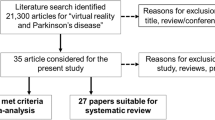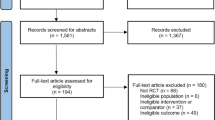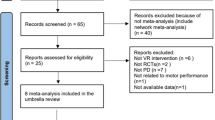Abstract
Virtual reality is an effective system to train balance and gait in Parkinson’s disease, but attrition of this intervention needs to be further examined. This study aims to review and meta-analyze the dropouts of participants in randomized clinical trials that used virtual reality for balance and gait training in people with Parkinson’s disease. An electronic search was conducted in PubMed, Web of Science, Scopus and CINAHL. The PEDro scale and Revised Cochrane risk-of-bias tool for randomized trials 2.0 were employed to assess methodological quality. Proportions meta-analysis calculated dropout rate. Odds ratio meta-analysis under 1 indicated lower attrition in experimental participants. Meta-regression identified possible dropouts’ moderators. A total of 18 studies were included. The pooled dropout rates were 5.6% (95% CI, 3.3%-9.3%) for all groups, 5.33% (95% CI, 3.03%-9.21%) in virtual reality, and 6.60% (95% CI, 3.84%-26.31%) in comparators. No statistical differences were found in the dropout occurred between the groups (OR 0.83; 95% CI, 0.62-1.12). Number of weeks was the unique moderator (coefficient 0.129, 95% CI 0.018- 0.239; p=0.02). Our overall pooled dropout should be considered in the sample size calculation of future studies. Adequate follow-up of the CONSORT guidelines in the loss report and their reasons could help design suitable retention strategies




Similar content being viewed by others
Data availability
The data used and/or analyzed during the current study are available from the corresponding author upon reasonable request.
Abbreviations
- PD:
-
Parkinson’s disease
- PICO:
-
population, intervention, comparator, outcomes.
- OR:
-
Odds ratio
References
Schiess N, Cataldi R, Okun MS, Fothergill-Misbah N, Dorsey ER, Bloem BR, et al. Six Action Steps to Address Global Disparities in Parkinson Disease. JAMA Neurol. 2022 Jul;79(9):929–36.
Cleary AS, Rossi A, States RA. Parkinson’s Disease: Exploring Motives for Long-Term Adherence to a Group Exercise Program. Rehabil Nurs. 2020 May;45(3):131–9.
Mangone M, Agostini F, de Sire A, Cacchio A, Chiaramonte A, Butterini G, et al. Effect of virtual reality rehabilitation on functional outcomes for return-to-work patients with Parkinson’s disease: An umbrella review of systematic reviews. NeuroRehabilitation. 2022 May 18;1–11.
Rose T, Nam CS, Chen KB. Immersion of virtual reality for rehabilitation - Review. Appl Ergon. 2018;69:153–61.
Bevens W, Weiland T, Gray K, Jelinek G, Neate S, Simpson-Yap S. Attrition Within Digital Health Interventions for People With Multiple Sclerosis: Systematic Review and Meta-analysis. J Med Internet Res. 2022 Feb 9;24(2):e27735.
Alagumoorthi G, D. BJ, Thirunavukarasu S, V. R, A. K. Effectiveness of Wii sports- based strategy training in reducing risk of falling, falls and improving quality of life in adults with idiopathic Parkinson’s disease- a randomized comparative trial. Clin Rehabil. 2022 Aug 22;36(8):1097–109.
Anwar N, Akram S, Ilyas A, Khalid K, Munir M, Hayat M. Comparison of Virtual Reality and Conventional Balance Training to Improve Balance and Walking in Parkinson’s Disease Patients. Med Forum Mon. 2021 Aug 13;32.
Carpinella I, Cattaneo D, Bonora G, Bowman T, Martina L, Montesano A, et al. Wearable Sensor-Based Biofeedback Training for Balance and Gait in Parkinson Disease: A Pilot Randomized Controlled Trial. Arch Phys Med Rehabil. 2017 Apr;98(4):622-630.e3.
de Melo GEL, de Moura RCF, Lopes JBP, Junior PRF, Lazzari RD, Duarte N de AC, et al. Effects of virtual reality on parkinsonian gait: Blind Controlled Randomized Clinical Trial Protocol. Man Ther Posturology Rehabil J. 2018 Jul 13;1–7.
Feng H, Li C, Liu J, Wang L, Ma J, Li G, et al. Virtual Reality Rehabilitation Versus Conventional Physical Therapy for Improving Balance and Gait in Parkinson’s Disease Patients: A Randomized Controlled Trial. Med Sci Monit. 2019 Jun 5;25:4186–92.
Ferraz DD, Trippo KV, Duarte GP, Neto MG, Bernardes Santos KO, Filho JO. The Effects of Functional Training, Bicycle Exercise, and Exergaming on Walking Capacity of Elderly Patients With Parkinson Disease: A Pilot Randomized Controlled Single-blinded Trial. Arch Phys Med Rehabil. 2018 May;99(5):826–33.
Gandolfi M, Geroin C, Dimitrova E, Boldrini P, Waldner A, Bonadiman S, et al. Virtual Reality Telerehabilitation for Postural Instability in Parkinson’s Disease: A Multicenter, Single-Blind, Randomized, Controlled Trial. Biomed Res Int. 2017;2017:1–11.
Kashif M, Ahmad A, Bandpei MAM, Gilani SA, Hanif A, Iram H. Combined effects of virtual reality techniques and motor imagery on balance, motor function and activities of daily living in patients with Parkinson’s disease: a randomized controlled trial. BMC Geriatr. 2022 Dec 30;22(1):381.
Liao Y-Y, Yang Y-R, Wu Y-R, Wang R-Y. Virtual Reality-Based Wii Fit Training in Improving Muscle Strength, Sensory Integration Ability, and Walking Abilities in Patients with Parkinson’s Disease: A Randomized Control Trial. Int J Gerontol. 2015 Dec;9(4):190–5.
Pazzaglia C, Imbimbo I, Tranchita E, Minganti C, Ricciardi D, Lo Monaco R, et al. Comparison of virtual reality rehabilitation and conventional rehabilitation in Parkinson’s disease: a randomised controlled trial. Physiotherapy. 2020 Mar;106:36–42.
Pompeu JE, Mendes FA dos S, Silva KG da, Lobo AM, Oliveira T de P, Zomignani AP, et al. Effect of Nintendo WiiTM-based motor and cognitive training on activities of daily living in patients with Parkinson’s disease: A randomised clinical trial. Physiotherapy. 2012 Sep;98(3):196–204.
Ribas CG, Alves da Silva L, Corrêa MR, Teive HG, Valderramas S. Effectiveness of exergaming in improving functional balance, fatigue and quality of life in Parkinson’s disease: A pilot randomized controlled trial. Parkinsonism Relat Disord. 2017 May;38:13–8.
Santos P, Machado T, Santos L, Ribeiro N, Melo A. Efficacy of the Nintendo Wii combination with Conventional Exercises in the rehabilitation of individuals with Parkinson’s disease: A randomized clinical trial. NeuroRehabilitation. 2019 Nov 7;45(2):255–63.
Shih M-C, Wang R-Y, Cheng S-J, Yang Y-R. Effects of a balance-based exergaming intervention using the Kinect sensor on posture stability in individuals with Parkinson’s disease: a single-blinded randomized controlled trial. J Neuroeng Rehabil. 2016 Dec 27;13(1):78.
Tollár J, Nagy F, Hortobágyi T. Vastly Different Exercise Programs Similarly Improve Parkinsonian Symptoms: A Randomized Clinical Trial. Gerontology. 2019;65(2):120–7.
van den Heuvel MRC, Kwakkel G, Beek PJ, Berendse HW, Daffertshofer A, van Wegen EEH. Effects of augmented visual feedback during balance training in Parkinson’s disease: A pilot randomized clinical trial. Parkinsonism Relat Disord. 2014 Dec;20(12):1352–8.
Yang W-C, Wang H-K, Wu R-M, Lo C-S, Lin K-H. Home-based virtual reality balance training and conventional balance training in Parkinson’s disease: A randomized controlled trial. J Formos Med Assoc. 2016 Sep;115(9):734–43.
Yen C-Y, Lin K-H, Hu M-H, Wu R-M, Lu T-W, Lin C-H. Effects of Virtual Reality–Augmented Balance Training on Sensory Organization and Attentional Demand for Postural Control in People With Parkinson Disease: A Randomized Controlled Trial. Phys Ther. 2011 Jun 1;91(6):862–74.
Bevens W, Shoushtari A, Jelinek P, Jelinek G, TJ W. Systematic review and meta analysis of differential attrition between active and control arms in randomized controlled trials of lifestyle interventions in chronic disease. BMC Med Res Methodol. 2021 Dec 14;21(1):122.
Ćwiękała-Lewis KJ, Gallek M, Taylor-Piliae RE. The effects of Tai Chi on physical function and well-being among persons with Parkinson’s Disease: A systematic review. J Bodyw Mov Ther. 2017 Apr;21(2):414–21.
Sulzer P, Gräber S, Schaeffer E, van Lummel R, Berg D, Maetzler W, et al. Cognitive impairment and sedentary behavior predict health-related attrition in a prospective longitudinal Parkinson’s disease study. Parkinsonism Relat Disord. 2021 Jan;82:37–43.
Goyal N, Lee Y, Luna G, Aruin AS. Individual and combined effects of a cognitive task, light finger touch, and vision on standing balance in older adults with mild cognitive impairment. Aging Clin Exp Res. 2020 May;32(5):797–807.
Dockx K, Bekkers EM, Van den Bergh V, Ginis P, Rochester L, Hausdorff JM, et al. Virtual reality for rehabilitation in Parkinson’s disease. Cochrane Database Syst Rev. 2016 Dec 21;2016(12):1–52.
Ellis T, Boudreau JK, DeAngelis TR, Brown LE, Cavanaugh JT, Earhart GM, et al. Barriers to Exercise in People With Parkinson Disease. Phys Ther. 2013 May 1;93(5):628–36.
Gomes SR, Trippo KV, Guimarães DO, Oliveira Filho J, Dominguez-Ferraz D. Motivation of elderly with Parkinson’s disease submitted to functional training, aerobic exercise and exergame. Acta Fisiátrica. 2018 Sep 30;25(3).
Author information
Authors and Affiliations
Contributions
Conceptualization, A.G-P and C.G-M; methodology, C.G-M, G.G-M; software and formal analysis, C.G-M; writing—original draft preparation, A.G-P, G.G-M, V.P-C, M.J-C.H, M.J.-V.G and C.G-M; writing, review and editing, A.G-P and C.G-M.; visualization, G.G-M and V.P-C; supervision, M.J-C.H and M.J.-V.G ; A.G-P and C.G-M contributed equally to this work. All authors have read and agreed to the published version of the manuscript.
Corresponding author
Ethics declarations
Ethical approval and consent to participate
Not applicable.
Human ethics
Not applicable.
Competing interests
The authors declare no potential competing interests.
Additional information
Publisher's Note
Springer Nature remains neutral with regard to jurisdictional claims in published maps and institutional affiliations.
Supplementary Information
Below is the link to the electronic supplementary material.
Rights and permissions
Springer Nature or its licensor (e.g. a society or other partner) holds exclusive rights to this article under a publishing agreement with the author(s) or other rightsholder(s); author self-archiving of the accepted manuscript version of this article is solely governed by the terms of such publishing agreement and applicable law.
About this article
Cite this article
Parra, A.G., Gonzalez-Medina, G., Perez-Cabezas, V. et al. Dropout Rate of Participants in Randomized Clinical Trials That Use Virtual Reality to Train Balance and Gait in Parkinson’s Disease. A Systematic Review With Meta-analysis and Meta-regression. J Med Syst 47, 46 (2023). https://doi.org/10.1007/s10916-023-01930-7
Received:
Accepted:
Published:
DOI: https://doi.org/10.1007/s10916-023-01930-7




